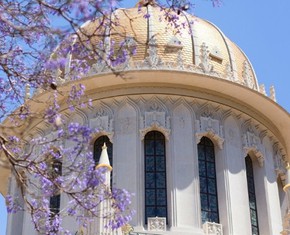The views expressed in our content reflect individual perspectives and do not represent the authoritative views of the Baha'i Faith.
While in exile in Baghdad, Baha’u’llah came to know the harmful, even murderous intentions of certain government officials and religious clergy.
As the recognized leader of the Babis, Baha’u’llah was a target. But he remained serene despite those looming threats, and began to reveal some of the most important Baha’i works. This fact alone would later distinguish the Baha’i Faith as a unique phenomenon in the world—a new world religion based on the original writings of its founder. As a result, anyone can read Baha’u’llah’s profound, beautiful writings today, and be inspired by them.
An accomplished poet and calligrapher already, in the late 1850’s Baha’u’llah wrote The Hidden Words, a powerful book composed of short aphorisms presented as if from the voice of God Himself speaking to the human heart and mind. Composed mainly while Baha’u’llah walked along the banks of the Tigris River, this work speaks to us about the love of God as humanity’s creative force:
O Son of Man! I loved thy creation, hence I created thee. Wherefore, do thou love Me, that I may name thy name and fill thy soul with the spirit of life. – Baha’u’llah, The Hidden Words, p. 4.
O Son of Spirit! Noble have I created thee, yet thou hast abased thyself. Rise then unto that for which thou was created. – Ibid., p. 9,
O Son of Man! Rejoice in the gladness of thine heart, that thou mayest be worthy to meet Me and to mirror forth My beauty. – Ibid., p. 12.
O Son Of Being! Busy not thyself with this world, for with fire We test the gold, and with gold We test Our servants. – Ibid., p. 16.
The mystical treatises and books Baha’u’llah wrote during this period, and the talks he gave to the increasingly larger and larger crowds of people who thronged to hear him, brought about a spiritual renewal among the Babis. Baha’u’llah taught them to avoid divisive politics, to obey just governments, be trustworthy and honest, to love their fellow human beings and be charitable, and to surrender their wills to the Will of God.
The writings of Baha’u’llah had a great impact on the spirituality of the Babis, and also began to spread his teachings to others. In the early 1860’s, Baha’u’llah wrote The Book of Certitude, which upholds the unity of God and His messengers. This book, often thought of as Baha’u’llah’s most important early work, portrays the great religions as a single, progressive revelation from the same God; part of one continual, cyclical process of spiritual guidance destined to lead humanity toward maturation.
Dictated over the course of two days, this remarkable work models a unique foundation for the establishment of unity between all religions, especially Judaism, Christianity and Islam, which all trace their heritage back to Abraham. Arabs and Jews descended from Abraham through his sons Ishmael and Isaac, respectively—and Moses, Jesus and Muhammad all claim Abraham as their forefather.
In The Book of Certitude, Baha’u’llah created a new vision of these founders of the world’s largest religions, whose followers often see them as competing prophets. Wars have been fought for centuries in attempts to prove the superiority of one Faith over another. But Baha’u’llah did not see God’s messengers or their religions as competitors—he saw them as divine educators in the same school of religion. He explained that the same God sent them to different peoples at different times to help them progress both spiritually and materially.
This central Baha’i teaching, known as progressive revelation, links all the founders of the world’s great Faiths in one chain of being, one single system of belief.
Baha’u’llah taught that the prophets of God bring the same ethical teachings in every age. Their specific prescriptions for living, the social laws of their Faiths, vary from age to age, however—because the needs of each time are different. In the words of Baha’u’llah, God sends all of these successive prophets:
… down from the heaven of the Will of God, and as they all arise to proclaim His irresistible Faith, they therefore are regarded as one soul and the same person. For they all drink from the one Cup of the love of God, and all partake of the fruit of the same Tree of Oneness. – The Book of Certitude, p. 152.
















Comments
Sign in or create an account
Continue with Googleor